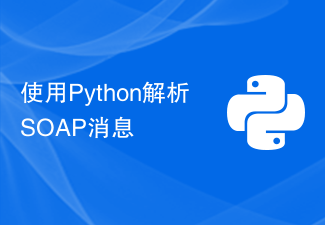 Backend Development
Backend Development PHP Tutorial
PHP Tutorial Analyzing the configuration optimization of Varnish cache under Linux_PHP tutorial
Analyzing the configuration optimization of Varnish cache under Linux_PHP tutorial
Varnish is a high-performance open source HTTP accelerator. Verdens Gang, Norway's largest online newspaper, uses 3 Varnish units to replace the original 12 Squid units, and the performance is better than before.
But compared with the old Squid, each has its own advantages and disadvantages. The large number of relative comparisons on the Internet are just based on the individual's maximum use of the applications he is familiar with. Maybe Squid has found capable hands. It is enough to exert its most powerful power
Varnish adopts "Visual Page Cache" technology. In terms of memory utilization, Varnish has an advantage over Squid. It avoids Squid from frequently exchanging files in memory and disk, and its performance is better than Squid. Squid high.
Through the Varnish management port, you can use regular expressions to quickly and batch clear part of the cache, which is something Squid cannot have.
I gave a brief introduction and notes on some insights and configuration methods of varnish
Experimental environment: Red Hat Enterprise Linux Server release 5.4 (Tikanga)
Kernel 2.6.18 -164.el5
yum install pcre-devel ##Pre-install a software package, otherwise an error will be prompted
tar zxvf varnish-2.1.3.tar.gz
cd varnish-2.1.3
./configure --prefix=/usr/local/varnish-2.1.3
make && make install
Edit the configuration file, there is a template, but there are too many comments, it is best to create a new one yourself
vim /usr /local/varnish-2.1.3/etc/varnish/varnish.conf
############Attached below are the contents and comments of the configuration file####### ###############
#http request processing process
#1, receive request entry status, judge pass or lookup local query according to vcl
# Lookup, search for data in the hash table, if found, enter the hit state, otherwise enter the fetch state
#pass, select the background, enter the fetch state
#fetch, obtain the request from the backend, send the request, and obtain the data , and perform local storage
#deliver, send the data to the client, enter done
#done, processing ends
##########Configure back-end server## ############
backend linuxidc01 {
.host = "192.168.1.142";
.port = "7070";
.probe = {
.timeout = 5s;
.interval = 2s; = 10;
.threshold = 8; "7070";
.probe = {
.timeout = 5s;
.interval = 2s;
.window = 10;
.threshold = 8;
}
}
#############Configure the backend server group, perform health check for 6 seconds, and use random method to set the weight########
## #######Another way round-robin is the default polling mechanism###################
Copy code
The code is as follows:
Copy the code
The code is as follows:
acl local {
"localhost";
}
########Determine which type of back server and cache configuration is targeted from the url######################### ###
sub vcl_recv
{
if (req.http.host ~ "^linuxidc15474.vicp.net") # Matching domain name jump backend server
{ set req.backend = linuxidc15474; }
else { error 404 "Unknown HostName!"; .ip ~ local)
{
error 405 "Not Allowed.";
return (lookup);
}
}
#Clear cookies that contain jpg and other files in the url
if (req.request == "GET" && req.url ~ ".(jpg|png|gif|swf|jpeg|ico)$")
🎜>
if (req.http.x-forwarded-for)
{
set req.http.X-Forwarded-For = req.http.X-Forwarded-For ", " client.ip;
}
else { set req.http.X-Forwarded-For = client.ip; }
##varnish实现图片的防盗链
# if (req.http.referer ~ "http://.*)
# {
# if ( !(req.http.referer ~ "http://.*vicp.net" ||
# req.http.referer ~ "http://.*linuxidc15474.net" ) )
# {
# set req.http.host = "linuxidc15474.vicp.net";
# set req.url = "/referer.jpg";
# }
# return(lookup);
# }
# else {return(pass);}
if (req.request != "GET" &&
req.request != "HEAD" &&
req.request != "PUT" &&
req.request != "POST" &&
req.request != "TRACE" &&
req.request != "OPTIONS" &&
req.request != "DELETE")
{ return (pipe); }
#对非GET|HEAD请求的直接转发给后端服务器
if (req.request != "GET" && req.request != "HEAD")
{ return (pass); }
##对GET请求,且url里以.php和.php?结尾的,直接转发给后端服务器
if (req.request == "GET" && req.url ~ ".(php)($|?)")
{ return (pass); }
##对请求中有验证及cookie,直接转发给后端服务器
if (req.http.Authorization || req.http.Cookie)
{ return (pass);}
{
##除以上的访问请求,从缓存中查找
return (lookup);
}
##指定的font目录不进行缓存
if (req.url ~ "^/fonts/")
{ return (pass); }
}
sub vcl_pipe
{ return (pipe); }
##进入pass模式,请求被送往后端,后端返回数据给客户端,但不进入缓存处理
sub vcl_pass
{ return (pass); }
sub vcl_hash
{
set req.hash += req.url;
if (req.http.host)
{ set req.hash += req.http.host; }
else { set req.hash += server.ip; }
return (hash);
}
##在lookup后如果在cache中找到请求的缓存,一般以下面几个关键词结束
sub vcl_hit
{
if (!obj.cacheable)
{ return (pass); }
return (deliver); { return (fetch); }
# Let the varnish server cache type, call
sub vcl_fetch
after getting the data from the backend { if (!beresp.cacheable)
{ return (pass); } if (beresp.http.set-cookie)
{Return (PASS);}
## Web server indicates the content that is not cached, the Varnish server does not cache
if (BeResp.http. Pragma ~ "no-cache" || beresp.http.Cache-Control ~ "no-cache" || beresp.http.Cache-Control ~ "private")
{ return (pass); }
# #Cache files containing jpg, png and other formats during access. The cache time is 7 days and s is seconds
if (req.request == "GET" && req.url ~ ".(js|css |mp3|jpg|png|gif|swf|jpeg|ico)$")
> if (req.request == "GET" && req.url ~ "/[0-9].htm$")
{ set beresp.ttl = 300s; }
return (deliver);
}
####Add to view cache hits in the page header information########
sub vcl_deliver
{
set resp.http.x-hits = obj .hits ;
if (obj.hits > 0)
{ set resp.http. "MISS cqtel-bbs"; }
}
#########################The above is the configuration file of varnish############# #############
Create user:
groupadd www
useradd www -g www
Create the cache location of varnish_cache
mkdir /data/varnish_cache
Start varnish
ulimit -SHn 8192 ####Set the file descriptor, because the performance of my machine is not good, you can set it according to your own configuration
/usr/ local/varnish-2.1.3/sbin/varnishd -u www -g www -f /usr/local/varnish-2.1.3/etc/varnish/varnish.conf -a 0.0.0.0:80 -s file,/data /varnish_cache/varnish_cache.data,100M -w 1024,8192,10 -t 3600 -T 127.0.0.1:3500
####-u What to run -g What group to run -f varnish configuration file- a Bind IP and port -s varnish cache file location and size -w minimum, maximum thread and timeout time -T varnish management port, mainly used to clear cache
#End varnishd process
pkill varnishd
Start varnishncsa to write Varnish access logs to the log file:
/usr/local/varnish-2.1.3/bin/varnishncsa -w /data/logs/varnish.log &
Daily Run at 0 o'clock, cut Varnish logs by day, generate a compressed file, and delete the old logs from last month (/var/logs/cutlog.sh):
vim /usr/local/varnish-2.1.3/ etc/varnish/cut_varnish_log.sh
Write the following script:
#!/bin/sh
# This file run at 00:00
date=$(date -d "yesterday" +" %Y-%m-%d")
pkill -9 varnishncsa
mv /data/logs/varnish.log /data/logs/${date}.log
/usr/local/varnish- 2.1.3/bin/varnishncsa -w /data/logs/varnish.log &
mkdir -p /data/logs/varnish/
gzip -c /data/logs/${date}.log > /data/logs/varnish/${date}.log.gz
rm -f /data/logs/${date}.log
rm -f /data/logs/varnish/$(date -d "-1 month" +"%Y-%m*").log.gz
Scheduled task:
crontab -e
00 00 * * * /usr/local/varnish-2.1.3/ etc/varnish/cut_varnish_log.sh
Optimize Linux kernel parameters
vi /etc/sysctl.conf
net.ipv4.tcp_fin_timeout = 30
net.ipv4.tcp_keepalive_time = 300
net.ipv4.tcp_syncookies = 1
net.ipv4.tcp_tw_reuse = 1
net.ipv4.tcp_tw_recycle = 1
net.ipv4.ip_local_port_range = 5000 65000
Make the configuration effective
/sbin/ sysctl -p
Batch clear cache using regular expressions through Varnish management port
Clear all caches
/usr/local/varnish-2.1.3/bin/varnishadm -T 127.0.0.1: 3500 url.purge *$
Clear all caches in the image directory
/usr/local/varnish-2.1.3/bin/varnishadm -T 127.0.0.1:3500 url.purge /image/
127.0. 0.1:3500 is the cleared cache server address www.linuxidc.com is the cleared domain name /static/image/tt.jsp is the cleared URL address list
/usr/local/varnish-2.1.3/bin/ varnishadm -T 127.0.0.1:3500 purge "req.http.host ~ www.linuxidc.com$ && req.url ~ /static/image/tt.jsp"
+++++++++++ ++++++++++++++++++++++++++++++++++++++++++++++++ ++++++
A PHP function to clear Squid cache
function purge($ip, $url)
{
$errstr = '';
$errno = '';
$fp = fsockopen ($ip, 80, $ errno, $errstr, 2);
if (!$fp)
{
return false;
}
else
{
$out = "PURGE $url HTTP /1.1rn";
$out .= "Host:blog.s135.comrn";
$out .= "Connection: closernrn";
fputs ($fp, $out);
$out = fgets($fp, 4096);
fclose ($fp);
return true;
} index.php");
?>
++++++++++++++++++++++++++++++++++++++++++++ +++++++++++++++++++++++++
Configure Varnish to automatically start at boot
vim /etc/rc.d/rc.local
Write the following content in the last line:
ulimit -SHn 8192
/usr/local/varnish-2.1.3/sbin/varnishd -u www -g www -f /usr/local/varnish-2.1.3 /etc/varnish/varnish.conf -a 0.0.0.0:80 -s file,/data/varnish_cache/varnish_cache.data,100M -w 1024,8192,10 -t 3600 -T 127.0.0.1:3500
/ usr/local/varnish-2.1.3/bin/varnishncsa -w /data/logs/varnish.log &
View the number of Varnish server connections and hit rate:
/usr/local/varnish-2.1.3/ BIN/VARNISHSTATTAT
The above is the status of Varnish,
1675 0.00 0.06 Client Requests Received client requests for the server receiving side
179 0.00 0.01 Cache Hits are the hits cache, and the data is returned from the cache to the customer. The number of passes, that is, the hit rate
11 0.00 0.00 Cache misses To skip the pass cache, the number of times data is obtained from the backend service application and returned to the user
Use help to see which Varnish commands can be used:
/ usr/local/varnish-2.1.3/bin/varnishadm -T 127.0.0.1:3500 help
 Python编程解析百度地图API文档中的坐标转换功能Aug 01, 2023 am 08:57 AM
Python编程解析百度地图API文档中的坐标转换功能Aug 01, 2023 am 08:57 AMPython编程解析百度地图API文档中的坐标转换功能导读:随着互联网的快速发展,地图定位功能已经成为现代人生活中不可或缺的一部分。而百度地图作为国内最受欢迎的地图服务之一,提供了一系列的API供开发者使用。本文将通过Python编程,解析百度地图API文档中的坐标转换功能,并给出相应的代码示例。一、引言在开发中,我们有时会涉及到坐标的转换问题。百度地图AP
 Python解析XML中的特殊字符和转义序列Aug 08, 2023 pm 12:46 PM
Python解析XML中的特殊字符和转义序列Aug 08, 2023 pm 12:46 PMPython解析XML中的特殊字符和转义序列XML(eXtensibleMarkupLanguage)是一种常用的数据交换格式,用于在不同系统之间传输和存储数据。在处理XML文件时,经常会遇到包含特殊字符和转义序列的情况,这可能会导致解析错误或者误解数据。因此,在使用Python解析XML文件时,我们需要了解如何处理这些特殊字符和转义序列。一、特殊字符和
 PHP8.0中的XML解析库May 14, 2023 am 08:19 AM
PHP8.0中的XML解析库May 14, 2023 am 08:19 AM随着PHP8.0的发布,许多新特性都被引入和更新了,其中包括XML解析库。PHP8.0中的XML解析库提供了更快的解析速度和更好的可读性,这对于PHP开发者来说是一个重要的提升。在本文中,我们将探讨PHP8.0中的XML解析库的新特性以及如何使用它。什么是XML解析库?XML解析库是一种软件库,用于解析和处理XML文档。XML是一种用于将数据存储为结构化文档
 使用Python解析SOAP消息Aug 08, 2023 am 09:27 AM
使用Python解析SOAP消息Aug 08, 2023 am 09:27 AM使用Python解析SOAP消息SOAP(SimpleObjectAccessProtocol)是一种基于XML的远程过程调用(RPC)协议,用于在网络上不同的应用程序之间进行通信。Python提供了许多库和工具来处理SOAP消息,其中最常用的是suds库。suds是Python的一个SOAP客户端库,可以用于解析和生成SOAP消息。它提供了一种简单而
 使用Python解析带有命名空间的XML文档Aug 09, 2023 pm 04:25 PM
使用Python解析带有命名空间的XML文档Aug 09, 2023 pm 04:25 PM使用Python解析带有命名空间的XML文档XML是一种常用的数据交换格式,能够适应各种应用场景。在处理XML文档时,有时会遇到带有命名空间(namespace)的情况。命名空间可以防止不同XML文档中元素名的冲突,提高了XML的灵活性和可扩展性。本文将介绍如何使用Python解析带有命名空间的XML文档,并给出相应的代码示例。首先,我们需要导入xml.et
 PHP 爬虫实战之获取网页源码和内容解析Jun 13, 2023 am 10:46 AM
PHP 爬虫实战之获取网页源码和内容解析Jun 13, 2023 am 10:46 AMPHP爬虫是一种自动化获取网页信息的程序,它可以获取网页代码、抓取数据并存储到本地或数据库中。使用爬虫可以快速获取大量的数据,为后续的数据分析和处理提供巨大的帮助。本文将介绍如何使用PHP实现一个简单的爬虫,以获取网页源码和内容解析。一、获取网页源码在开始之前,我们应该先了解一下HTTP协议和HTML的基本结构。HTTP是HyperText
 PHP中的HTTP Basic鉴权方法解析及应用Aug 06, 2023 am 08:16 AM
PHP中的HTTP Basic鉴权方法解析及应用Aug 06, 2023 am 08:16 AMPHP中的HTTPBasic鉴权方法解析及应用HTTPBasic鉴权是一种简单但常用的身份验证方法,它通过在HTTP请求头中添加用户名和密码的Base64编码字符串进行身份验证。本文将介绍HTTPBasic鉴权的原理和使用方法,并提供PHP代码示例供读者参考。一、HTTPBasic鉴权原理HTTPBasic鉴权的原理非常简单,当客户端发送一个请求时
 PHP中的单点登录(SSO)鉴权方法解析Aug 08, 2023 am 09:21 AM
PHP中的单点登录(SSO)鉴权方法解析Aug 08, 2023 am 09:21 AMPHP中的单点登录(SSO)鉴权方法解析引言:随着互联网的发展,用户通常要同时访问多个网站进行各种操作。为了提高用户体验,单点登录(SingleSign-On,简称SSO)应运而生。本文将探讨PHP中的SSO鉴权方法,并提供相应的代码示例。一、什么是单点登录(SSO)?单点登录(SSO)是一种集中化认证的方法,在多个应用系统中,用户只需要登录一次,就能访问


Hot AI Tools

Undresser.AI Undress
AI-powered app for creating realistic nude photos

AI Clothes Remover
Online AI tool for removing clothes from photos.

Undress AI Tool
Undress images for free

Clothoff.io
AI clothes remover

AI Hentai Generator
Generate AI Hentai for free.

Hot Article

Hot Tools

Notepad++7.3.1
Easy-to-use and free code editor

Atom editor mac version download
The most popular open source editor

Dreamweaver Mac version
Visual web development tools

Dreamweaver CS6
Visual web development tools

DVWA
Damn Vulnerable Web App (DVWA) is a PHP/MySQL web application that is very vulnerable. Its main goals are to be an aid for security professionals to test their skills and tools in a legal environment, to help web developers better understand the process of securing web applications, and to help teachers/students teach/learn in a classroom environment Web application security. The goal of DVWA is to practice some of the most common web vulnerabilities through a simple and straightforward interface, with varying degrees of difficulty. Please note that this software





